Displaying items by tag: Peter Malone's Movie Reviews
King of the Apocalypse
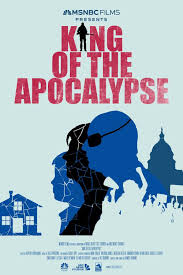
KING OF THE APOCALYPSE
US, 2025, 84 minutes, Colour.
Directed by Daniel Vernon.
Stewart Rhodes, founder and leader of the patriotic militia, the Oath Keepers in 2009, was one of the leading figures at the January 6th 2021 uprising. In 2022 he was found guilty and sentenced to prison. In 2025 he, along with so many of the other participants in the uprising, were pardoned by President Trump.
This is his story. It is also the story of his son, Dakota Adams, and of Rhodes’ wife, Tasha Adams. The film has been directed by Daniel Vernon, director of a wide range of documentaries for 20 years. But, it is very much the documentary by Dakota Adams.
He is initially seen at a microphone, making a pod cast, beginning the narrative about his father, his background, lack of education, the encounter with Tasha, their marriage, his gaining a law degree, practising in Las Vegas. The couple seem very happy. They have six children. Then, during Dakota’s narration, there is a long interview, interspersed throughout the film, with Tasha herself and her perspective on her life, relationship with her husband, her children, and then working for him, especially when his perspective became more religious, more apocalyptic and the family moved to the wilds of Montana. She worked for her husband, found herself trapped organising his business and connections, more and more alienated. And, then there are some interviews from one of the daughters and her perspective, even more highly alienated, on her father and his beliefs and activities.
One of the visual advantages of the film is that so much of the material is illustrated by home movies, by some animation, by clips from feature films, B-budget of the past, which are obviously now in the public domain but serve as dramatic counterparts to this story of Stewart Rhodes.
Rhodes and his wife were brought up as Mormons, Stewart being baptised in several churches. His perspective became more and more apocalyptic, anticipating the end of the world (with some clips from early Jesus silent films), becoming more and more possessed by his ideas, his son referring to him as increasingly paranoid, and his becoming highly authoritarian in the house, and always promoting his view of loyalty to the Constitution.
In 2009 he established the Oath Keepers, a rapidly increasing group of right-wing patriots, especially with members of the Armed Forces returning from service in Iraq and Afghanistan. Many sequences of the Oath Keepers, military style, interviews with Whip Simmons, who worked for Rhodes, is interviewed along with his mother, the significant sequence voicing Trump in ideas and, especially, with his enormous range of guns at home, argument for the Second Amendment and not giving up arms, and was indicted.
This film is an opportunity to look behind the scenes of those involved in January 6. An opportunity to see and hear them.
In the aftermath, Tasha was able to divorce her husband and support her son. Dakota, highly influenced when young by his father and his expectations, moving away from this-patriotism and is seen finally at a meeting, standing for politics and collaboration with people rather than the authoritarian mode.
This documentary can be seen in connection with the continually emerging documentaries about Donald Trump and the Trump era.
To Make a Killing/ Vicious!
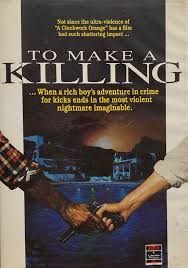
TO MAKE A KILLING
Australia, 1988, 88 minutes, Colour.
Tamblyn Lord, Craig Pearce, Tiffiny Dowe, Kelly Dingwall, Joanna Lockwood, Gerard Maguire, Louise Cullen, John Clayton, Ralph Cotterell.
Directed by Karl Zwicky.
Probably best to say by way of introduction to a review, that this is one of the worst Australian feature films. It was retitled Vicious! For international release. Indeed, the characters and the perspective that the film are particularly vicious.
There may have been some interesting speculations at the core of the plot which, surprisingly in retrospect, has a credit for Original Idea by P.J.Hogan – who directed one of the best of Australian films, Muriel’s Wedding. Hogan wrote the screenplay with the director, Karl Zwicky, who had a long career principally in television.
Strong criticism could be made of the plot and its awkward development – and its factual credibility and its psychological credibility or not. A lot of the dialogue is very stilted as is the staging, photography, editing. It is someone reminiscent of television series of the period. And, perhaps the actors are doing their best with the dialogue, but the performances are often awkward and, one might uncharitably say, terrible.
This is the story of a bored wealthy university student who, for kicks, joins up with a team of absolute hooligans with consequences of robbing houses, gross sexual violence, some crass language which is surprising in retrospect from 1988, and, eventually home invasion, violence and killings.
The film is one of the Ozploitation films produced by David Hannay in the 1980s, somewhat looked down on in their time – but no rehabilitation for them decades later.
It went straight to video even in the 1980s.
(A redeeming thought – Craig Pearce who plays the psychotic lead went on to be the co-writer of five films directed by Baz Luhrmann)
Vita a Vida/ Cheers to Life
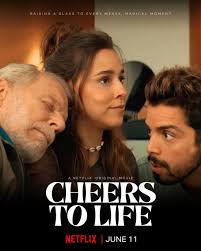
VITA A VIDA/ CHEERS TO LIFE
Brazil, 2024, 103 minutes, Colour.
Thati Lopes, Roderio Simas, Regina Braga, Jonas Bloch, Diego Martins.
Directed by Cris D'Amato.
The title is the equivalent of “To Life” and the Hebrew “L’ Chaim”. While this is a Brazilian production, there has been a collaboration with Israel, the early part of the film set in Brazil itself, in black-and-white in the 1970s, in colour in 2023. But, a great deal of the film was made in Israel itself. Which means that for the Israeli audience, there is a connection with the diaspora in Brazil and a lighthearted romance with some family problems. Which also means for the Brazilian audience a trip to Israel, literally going on tour, the sights of Tel Aviv, Joffa, of the Mediterranean, of a trip to Jerusalem, the overview of the city, the Wailing Wall, a trip down towards
Eilat, out in the Negev, a trip to the Dead Sea and a cable car to Masada. An enjoyable opportunity to see quite something of Israel.
This film could be described as a romantic comedy. The focus is on Jessica, her mother dead, not knowing anything of her family. But she has a necklace memory with a photo. She works, somewhat messily, in an art shop. She does not get on well with her boss.
She encounters Gabriel, in a tangle with his photographer wife. As they get to know each other, it emerges that they are related, some family background, sisters remaining in Brazil but in the 1970s, another sister eloping with an adventurous type and relocating in Israel, cutting off all connections with Brazil.
Discovering that she and Gabriel are cousins, Jessica “borrows” some jewellery to pay for airfares for them to go to Israel to search out her mysterious grandmother.
On the one hand, we can all enjoy the tourism in Israel. On the other, there are the grandparents, she walking out on her husband who used to be adventurous but now wants lentil soup every second Wednesday. In fact, he owns the tourism company. (And there is a very camp enthusiastic guide, a gay couple, a married couple and three Catholic nuns in their habits, all enjoying the sights and the activities.)
There are various crises, finding the right moment to reveal identities but, of course, it happens at the wrong moment with a few dire consequences, disbelief from the grandfather, and moments of joy from the grandmother who did not know she had a granddaughter.
There are many celebrations, a Bat Mitzvah, plenty of Haga Navila – and, during the final credits, a bus in the desert with the drapes flying, homage to Priscilla!
Slight but enjoyable in its way, romantic and slapstick, but especially for Brazilians and Israelis.
Ballerina/2025
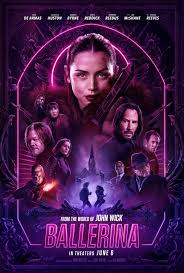
BALLERINA
US, 2025, 124 minutes, Colour.
Ana de Armas, Keanu Reeves, Ian McShane, Angelica Huston, Gabriel Byrne, Catalina Sandina Moreno, Ava Joyce McCarthy, Norman Reedus, Lance Reddick.
Directed by Len Wiseman.
For box office purposes, but not on the screen itself, “From the world of John Wick”. And, yes, John Wick is in the film and, after the first four episodes, it might have been called John Wick 5 but 1/3.
During the final credits, there is something of a pounding song, and a repetition of the lyrics, “fight like a girl”. And, given the number of violent confrontations that Eva, the ballerina, has to become involved in, there is plenty of opportunity to see her fighting like a girl but, with her mixture of ballet training and mixed martial arts training since she was little, she is more than a match for many of the and large bruiser thug men who engage with her.
The world of John Wick is re-created, the pervading black and décor with slashes of red, Angelica Huston once again presiding over the world of assassins, and behind the scenes sequences of prim ladies operating a phone service where the bounties on targets are increasingly magnified in the millions of dollars. And, there are some moments with Ian McShane again and, it would seem inserted after his untimely death, a glimpse or two of Lance Reddick.
The complication of this plot is a warlord, based in central Europe, owning his own often snowclad village, everybody loyal to him to the death, so many proving it to the last , The Chancellor. He is played by Gabriel Byrne at his most violently relentless, not a moment of sympathy even for his own children – except his granddaughters whom he abducts after violent confrontations with their fathers. And, so, the young Eva is taken, escapes and is under the almost relentless care of Angelica Huston, the ballet, the fights.
Eva is played by Ana de Armas who may be rather small but is motivated with steely determination, skills, strategies, and an extraordinary capacity for escaping the most dire of traps. Ultimately, the buildup to the confrontation with The Chancellor could lead to brutal feuds between the assassin companies. Which means then that John Wick has to enter the film, serve initially as a kind of peacemaker, reconciler, but, ultimately, Eva’s rescuer.
To reacquaint with the world of John Wick, this reviewer checked on the review of John Wick Chapter 4 and found this conclusion:
So, the fans will be satisfied. The non-fans will not see the film.
Watching films like the John Wick chapters seems to offer the viewers many adrenaline rushes of vicarious sadistic voyeurism.
The same for Ballerina.
Widow's Game, A/ La Viuda Negra
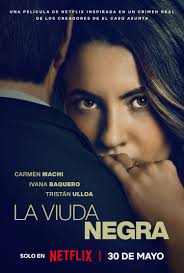
A WIDOW's GAME/ LA VIUDA NEGRA
Spain, 2025, 122 minutes, Colour.
Carmen Machi, Ivana Baquero, Tristan Ulloa, Pablo Molineror, Pepe Ocio, Alex Gadea, Joel Sanchez.
Directed by Carlos Sedes.
An interesting crime drama from Spain.
Initially, this film seemed like a Spanish variation on an episode of Vera, a focus on older middle-aged detective, with a daughter and problems with her treatment at school. She has a team working with her, again reminiscent of the collaboration of Vera and her team. There is a moment of sadness when one of them is killed in a car accident.
However, while the detective appears at the beginning and in the final sequences, the focus throughout most of the film is on the crime. A man is found murdered in a car park. There is suspicion on his wife, 10 years younger, ambitious, but with an alibi. And there is the background of his family, their concern about his death and their suspicions, especially by his brother who takes action. And there is the background of the wife, very religious, explicitly so, Catholic tradition, seen especially in the flashback to the wedding as well as the scene of the husband’s funeral.
The detective has difficulties with her boss and also with the magistrate/judge that she contacts in order to get warrants for phone tapping and surveillance. Ultimately, revelations about the case do rely on a great number of phone taps and surveillance, a gradual unmasking of the personality of the young wife, her social life especially going out with a friend, her starting an affair at a club before she was married, her husband made no allowances for her.
Gradually, further revelations about relationships, her hypocrisy and weeping so heavily on her husband’s coffin, the audience growing in dislike of her. Then it is further complicated by her work as a nurse at the hospital, one of her associates there, married with teenage son, becomes infatuated with her.
The last part of the film focuses on the planning for the murder, the carrying out of the killing, the effect on the various people participating, the setup for unmasking her, the arrest.
And final information at the credits indicates that this film was a reworking of an actual murder case.
- The Spanish title and the tradition of Black Widows? The English title and Maje and her manipulations?
- Based on an actual case, the situation, the murder, complicity, manipulation? The investigation, detectives, arrests?
- Valencia, the atmosphere of the Spanish city, buildings, the streets, ocean views? Apartments, the church, police precincts, hospitals? Authentic atmosphere? The musical score?
- The impact of the initial murder, the audience not seeing the body, the garage, the body discovered, the arrival of Eva and the police, the identification of the victim, his wife?
- The focus on the police and their work, Eva and her age, character, difficulties with her daughter and the education system, the sequence at home with Eva weeping and her daughter consoling her? The other members of the team, Berni, his collaboration, older, his death in the accident? Turri, Eva relying on him, the other members of the team? Surveillance of the scene, the range of interrogations, Eva and her shrewdness, the clash with her superior, her continually going to the judge, his hesitations, bargains, and finally, the gift? Permissions, the tapping of the phones, reading the texts? Building up the evidence? The restaurant sequence, the microphone hidden with the serviettes? The range of characters, suspicions, following, the final focus on Slava, the interrogations of Maje, her manipulations? Final success?
- The marriage situation, Maje and the engagement, her infidelity before the wedding, continued contact with Andres, Arturo forgiving her, his parents’ attitude, his brother’s attitude towards her, her own parents, their religiosity, the church wedding and declaration? Maje, her age, self-centred, continually out with her friend, dancing and dating, the encounter with Dani, the relationship, his love for her, not knowing she was married? Her work at the hospital? Anger with her husband? Wanting free of him?
- The relationship with Salva, at the hospital, his age, wife and teenage son and the bond? His infatuation with her, the affair? Maje using him, lying about her husband, playing the victim, playing with his emotions, setting up the scene, the key, the explanations, persuading her husband where to park, the murder?
- The consequences for Maje, pretending, the fake outpouring of grief with his coffin? The visits to his family, the criticism that she did not mourn her husband? The continued contact with Dani? Going to the clubs? The relationship with Salva, gradually alienating herself from him, lying, the plans with Dani? His continued infatuation, excusing Maje? Keeping his distance, the issue of the key, his lying for her?
- The police focusing on her, the meetings, the recordings, getting enough evidence?
- The interrogations of Maje, her lying, fears, older her, lying about Solo, condemning him, denying the relationship? Proof against her? Eva and the interrogation, breaking him down?
- The final information about either, leaving the force? About the sentences for Maje and self? Based on an actual case?
Streetcar Named Desire, A, National Theatre Live
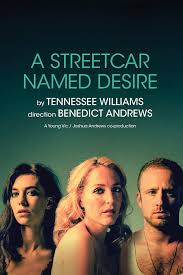

A STREETCAR NAMED. DESIRE-National Theatre Live
UK, 2014, 188 minutes, Colour.
Gillian Anderson, Ben Foster, Vanessa Kirby, Corey Johnson.
Directed by Benedict Andrews.
A Streetcar Named Desire is considered one of the great American plays of the 20th century, with Tennessee Williams named alongside Eugene O’Neill and Arthur Miller. It made an impact in 1947 with its down-to-earth themes, class differences, transition from old ways to modern, mental illness. And the setting is New Orleans, at the end of a line of streetcars, the destination, ironically because of the motivations of the characters, Desire.
Tennessee Williams had very strong career from the 1940s to the 1960s, many of his plays turned into celebrated movies. In fact, the 1951 film version of Streetcar, Oscars for Vivien Leigh, Karl Malden, Kim Hunter, and nomination for a smouldering Marlon Brando, is still considered a classic. Since then, many stage productions, many filmed versions for television.
This performance was for the National Theatre in 2014, and filmed for National Theatre Live. It has been widely seen and a decision made to re-release it for 2025.
As a filmed play, the audience sees the very creative set, the shape of a small house, upstairs as well, the frames for the room, some curtains to be pulled back and forth, theatre in the round, different views as the characters move around within the house as well as outside. And, for the change of scenes, lights dim, some reverberating music, the actors and stagehands all coming onto the scene to rearrange furniture, to clean up mess, the audience caught up in this theatricality.
And one of the main reasons for seeing this version is the presence and performance by Gillian Anderson, American, The X-Files, but spending much of her life and career in the UK, films and television, her performance in The Salt Path released at the same time as Streetcar. She is decaying southern Belle, Blanche Dubois. She offers a powerful performance, highly emotional, and, not just hearing her speak her lines but with close-up, the intensity of her body language, a dramatic focus on her face and emotions. And, it is summed up with her final line of the play, so often quoted, “I have always relied on the kindness of strangers.”.
Ben Foster as Stanley Kowalski offers quite a different interpretation from Marlon Brando. He is an ordinary man of the suburbs, with friends at the local bowling alley, playing poker at home, devoted to his wife, but with macho attitudes, often erupting in anger and instances of sexual aggression. Vanessa Kirby, who is to emerge in successive years with a strong stage and screen reputation, is Stella.
The tone and the costumes for this interpretation are very much 21st-century, and some anomalous moments with the use of a mobile phone and references to long distant calls and talking with the operator. Stella and the other women in the play with their costume design, often brief and minimal, might have been looked down on in 1947. But, Blanche is the complete contrast, very much the look and dresses of that period.
This is a long play, especially the second half with its dramatics of Blanches delusions, her fantasies, and not wanting to be seen in the light, her mental disturbances. But, there are ordinary themes, the gentlemanly Mitch and his attentions to Blanche, Stella and her pregnancy, Stanley and his mates.
And, finally, a great deal of pathos as the doctor and the nurse arrive to take Blanche away, their walking slowly around the house set, the audience having time to reflect on what they have seen, and absorb their experience of sharing the sadness and pathos of Blanche’s decline.
Armor/ Armored
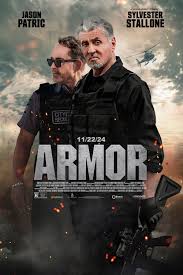
ARMOR/ARMORED
US, 2024, 89 minutes, Colour.
Jason Patric, Sylvester Stallone, Josh Wiggins, Dash Mihok.
Directed by Justin Routt.
Armor (original title, later Armored) is a security van robbery thriller. It received very bad reviews from the critics and not a great response from the public. However, it has found a life on Netflix streaming.
The setting, sometimes spectacular, is the border of Louisiana and Mississippi, the Mississippi River and a blocked bridge over it which serves as a dead end for the security van which is being pursued by cars with a team of thieves.
However, there is a family theme running throughout. Jason Patric is an alcoholic, former policeman, hyper-conscientious on duty, holding up a speeding car, then his own car, with wife and son, crashed into by a truck, the death of his wife. And he has become an alcoholic, organising meetings and urging members of the group to sobriety he still secretly drinks.
He has invited his son, Josh Wiggins, to work with him as a security guard. His wife is pregnant – and there is a family scene where father comes to dinner and there is some goodhearted and good-humoured banter.
In the meantime, there is a scene with a prisoner who is treated very leniently by guards, communicating with a government agent, and the arrangement of gold coins to be transported in the security van, with the connivance of the owner of the company.
There is family conversation on the drive, then the pursuit by the thieves. Sylvester Stallone, in a rather rare performance as a villain, is the leader. However, they are quite an erratic group, especially Dash Mihok doing a psychopathic turn. The two men in the van are determined to save the day, despite all kinds of gunfire attacks, teargas, the overturning of their vehicle.
While there is some madness and frantic wanting to attack in some of the group, Stallone’s character stays very calm, in control, not wanting to be a killer, eventually, after the overturning of the truck, its falling into the Mississippi, the two men escaping but being confronted by a psychopath, they are saved by Stallone.
There is some background to the gold coins that are being transported, contact with the prisoner, his being paroled, connection with the agent… Perhaps a possibility for a sequel which has not eventuated.
Innocent Prey

INNOCENT PREY
Australia, 1984, 80 minutes, Colour.
P.J. Soles, Kit Taylor, Greg Taylor, Martin Balsam, John Warnock, Richard Morgan.
Directed by Colin Eggleston.
A psychological thriller from the hero of so-called exploitation thrillers, the 1980s, especially a river range of films by producer, David Hannay. They were criticised as exploitation of the time – and time has not improved their reputation or the quality.
The co-writer director, Colin Eggleston, had a career in television and with films, especially Long Weekend. Filming for Innocent Prey took place both in Dallas and in Sydney. In those decades, American actors came out to perform in Australian films, here P.J.Souls who appeared in Carrie. And, in a surprising guest spot as a sheriff, Oscar-winner, Martin Balsam.
The first part of the film is in Texas, Cathy in a marriage with Joel, his alleged business interests, a meeting with some oily alleged businessman who threaten him, his then going to a motel, hiring a prostitute, and/-killing her. Cathy had taken her Australian friend to the airport, driving back had noticed her husband’s car, looked in the window and witnessed the killing. She goes home. He arrives, menaces her but she is saved because she has been in contact with her friend, the sheriff. The husband is arrested and imprisoned – but a violent escape, hiding his identity and making for Australia where Cathy has decided to move.
Another weird character in Sydney, a wealthy man who has set up cameras in a mansion he owns, spying on Cathy’s friend, then spying on Cathy when she arrives. But, he then makes himself known and ingratiates himself with Cathy. However, there is a divorced father who is a friend, with Cathy falling in love… And a nice family sequence.
Surprisingly, the slasher husband is peremptorily killed off while audiences may have been expecting quite a dramatic, melodramatic confrontation. But, then it is the turn of the eerie neighbour, a deadly confrontation with the divorced husband, and a melodramatic climax – with unnecessary detail of the husband having a razor.
The film was delayed for seven years in release. It is fairly unpersuasive decades later.
Karate Kid: Legends

KARATE KID: LEGENDS
US/Canada, 2025, 93 minutes, Colour.
Jackie Chan, Ben Wang, Ralph Macchio, Joshua Jackson, Sadie Stanley, Ming-Na Wen, Wyatt Oleff, Aramis Knight.
Directed by John Entwhistle.
The popularity of the Karate Kid lives on. The original film, starring Ralph Macchio and Pat Morita, was released in 1984, a sequel in 1986, another in 1989, and a female version later with Hilary Swank. The films have had a large following – especially judging by the popularity of this film, 40 years later from the original, young audiences eager to see it.
And, they will enjoy it. And, so will all those parents who remember seeing the films on television, as well as the grandparents who remember the films so well from the 1980s!
And, the filmmakers wisely have a prologue here, a clip from the original, reminding audiences of Mr Miyagi and Daniel LaRusso. We, the audience, are immediately drawn into the atmosphere.
The first part of this film is set in Beijing, with Jackie Chan (now aged 70 with more than 150 film and television credits) running a kung fu Academy, a special student, Li Fong who has special talent and whose brother was killed by thugs, friends of a contestant he had beaten. Li’s mother is a doctor, forbidding her son to fight. Then, suddenly, she is transferring to work in a hospital in New York, taking her son with her.
The action in this film moves at quite a sprightly pace, keeping the attention of the modern young audience. And, while all the expected ingredients turn up, they are presented with verve, likeable characters, some humorous lines and situations that keep us smiling as well as involved. The filmmakers have certainly read the current sensibilities of young audiences very well and responded accordingly.
Ben Wang is a pleasing strong screen presence, audiences quickly identifying with him, some charm, some awkwardness, the tensions with his mother, caught up immediately with bullies, charming who Mia who works at her father’s pizzeria, he a former champion boxer and athlete. And, there is the immediate challenge from the arrogant (and, of course, to be ultimately defeated) Conor Day, asserting himself as Mia’s boyfriend.
Soon Mr Han, Jackie Chan, arrives in New York City, takes over the training of Li, especially for the 5 Boroughs annual competition. Mr Han has a great admiration for Mr Miyagi, photos, memorabilia. So, he immediately seeks out Daniel LaRusso trying to persuade him to come to New York to train Li. So, halfway through the film, here is Ralph Mackey again, in his early 60s, but still alert and active (and he is the star of the celebrated television streaming, Cobra Kai). Kung Fu and Karate, two branches, one tree!
In a way, we could write the screenplay ourselves at least in terms of the events. However, it is all presented in such a lively and engaging way, we want to see the expected events, we want to see how they turn out, the challenges, the difficulties, and, of course, the romance as well as mother’s relenting. And, we relish the defeat of the arrogant bully. It all happens and we are happy and satisfied.
Ben Wang is such an engaging screen personality he may well get the opportunity to be the Karate Kid again.
- The popularity of the original films, of Mr Miyagi, of Daniel? The sequels, television? Current audiences liking the films? A new opportunity?
- The plot of the original, the teachers, the students, karate, the skills, threats, competitions, achievement? Updated to the 2020s?
- The device of having the opening clip from the original film, the tribute to Pat Morita and Mr Miyagi, the reminder of Daniel and Ralph Macchio?
- The Beijing opening, Mr Han, Jackie Chan and his reputation, Kung Fu, the young students, Li behind the screen, his mother’s arrival? The background of his brother’s fight, victory, attacked and killed? The effect on Li and his grief, on his mother, her forbidding fighting?
- The transfer to New York City, farewell to Mr Han, settling in, the apartment, Li going to the pizzeria, meeting with Mia, her father, the attraction? His going to school, Alan as his coach, classes, study? The encounter with Mia and his helping her? The promise to see the city, on the back of the motorbike, breaking down, on the train, confronted by Conor Day and his associates? The background of his father, Mia’s father and the loan, the thugs and Li fighting them off, the hostility?
- Li, engaging personality, Mr Han’s arrival, the training, the Five Boroughs’ competition? His mother seeing the poster, forbidding him? His training nonetheless?
- Mia’s father, Li training him, techniques, boxing, his being knocked out, Li holding, remembering his brother, Mia urging him on, his failure, her upset with him, cutting him off? His seeing her with Conor Day? Upset?
- Mr Miyagi going to see Daniel, the meeting, the memories, Mr Miyagi? Daniel not wanting to come, Mr Han so persuasive, his arrival? Their working together, the training sequences, Kung Fu and Karate as two branches of the one tree?
- Readiness for the competition? The style, the posters on the screen, the bouts, the scores, the editing and pace? Li moving up the ranks? His rival moving up the ranks, the final, the confrontation?
- The humorous situation of the training for the particular somersault and kick, Li and his favours, going to the subway station, his training, eventually success, the trap for his rival?
- The final fight, Li losing, then catching up, the final equality, the trap and technique, victory? His rival as a bad loser, pushing the referee? His father’s anger? Li and the support of Mr Han, Daniel, Mia and her father? His rival finally accepting defeat and bowing?
- The happy ending, at the pizzeria, the special of full edges, Li working, the relationship with Mia, her vitality and charm? The future?
Extraordinary Journey of the Fakir, The
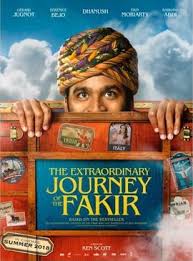
THE EXTRAORDINARY JOURNEY OF THE FAKIR
India, UK, 2018, 93 minutes, Colour.
Dhanush, Berenice Bejo, Erin Moriarty, Ben Miller, Gerard Jugnot, Barkhad Abdi.
Directed by Ken Scott.
An enjoyable mixture of Indian storytelling, comedy, song and dance, along with satire on the British, and dipping into French romance – with stops in Barcelona and Rome as well as a flight on a hot air balloon and landing on a ship in the Mediterranean.
Indian entertainer, Dhanush, is obviously enjoying himself, especially in telling his story to three 13-year-olds who are in danger of going into detention.
But, back to France There is a story of his being a youngster, mischievous, an absent French father, in the care of his mother. He also spent some weeks confined in a jail, a fellow prisoner, as in The Count of Monte Cristo, making contact and describing the outside world to him (and his later being moved by the story and writing it on a shirt while hiding as a stowaway on a plane). His ambition is to visit Paris and for his mother to go to Paris.
He is a street magician, gets the money, a valid passport and a fake bank note. Adventures in Paris, a roguish taxi driver, an encounter with a young American, some enjoyable scenes in a department store, reenacting home scenes with Mary, the American. While hiding in the store, his wardrobe is taken on a truck to England with refugees, an encounter with British officials, a satiric turn from Ben Miller, including an unexpected song and dance routine, friendship with the refugees from Africa, all finding themselves in Barcelona, then his escape in luggage to Rome, an encounter with a film star played by Berenice Bejo, good fortune, the balloon adventure, back to France, Mary with a new partner, his disappointment and his return to India. Yes, an extraordinary journey.
Of course, happy ending, his finding his feet in teaching, Mary returning, and his mother buried in Paris.
- The title and expectations? The Indian setting? The characters, Aja, young, growing up, adult, the various locations, Paris, London, Barcelona, Rome, the ship on the sea? The musical score, Indian style, songs?
- Aja as a magician, as a boy, with the other children, playing, mischief? His being put in the cell for three weeks, the contact with the blind man, his descriptions? Later writing his story on the shirt? His absent father, the letter, France? Is mother, hardships? Her wanting to go to Paris? His growing up, his journey?
- The framework of telling the story to the three boys, their age, his encouragement of them, their curiosity, response, avoiding jail, going to school every day?
- Aja and his character, getting the passport, the fake bank note? The plane, excitement of arrival in Paris, the taxi driver, taking advantage of him, his going to the Eiffel Tower, encounter with Mary, his questions, the exchange, the polite kiss? To meet again? In the store, the re-enactment of domestic sequences with the furniture? His hiding in the cupboard, its being taken, on the truck?
- The back of the truck, the refugees, their accepting him, the special friendship with Wiraj, destination England, passport control, running away, his magic on the policeman intrigued? Taken into custody, officer Smith, hardheaded, destroying his passport, assuming he was a refugee? The song and dance routine in the corridor? Being sent to Barcelona? The whole group?
- Barcelona, customs, the phone call to England? The whole group rounded up, the dormitory, his getting jobs, cleaning, the locked door? Finding it open, getting into the luggage?
- The flight to Rome, in the luggage, Nelly and her surprise, a style, actress? Confronting Aja at the hotel? His story, the shirt, reading the story, moved to tears? Her helping him with the money, selling it to her ex-husband? Her clashes with him? His giving the money, the encounter with the rival director, finding out the truth? At the club, the song and dance routines, the focus on him?
- The pursuit, the hot air balloon, the film director firing at him? Happy flying, no gas, landing on the boat, the captain and his case full of money, surrendering it?
- Back to France, the group, invading the ship, getting the money back?
- The balloon, the phone call for Mary, his learning that she had found a partner?
- Back in Paris, the taxi driver that he met initially, cheating him the first time, now taking his money, the escape? The encounter with Mary, with her partner?
- Meeting the refugees, his money, the interviews with each of them, giving practically all his money away, generosity and happiness?
- Mary, her girlfriend, the discussions about lesbians? The outings? Mary and her job, being promoted? The Eiffel Tower, Aja not turning up, the meeting with Peter, the bonding, the relationship? Meeting Aja? Her continued memories of Aja?
- His getting the money, returning to India, teaching, the classes, Mary’s arrival? The happy ending? And the encouragement of the boys?